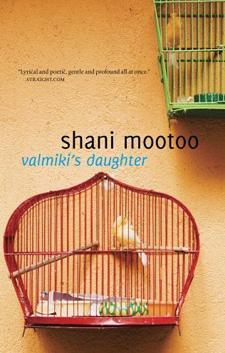Valmiki’s Daughter is Shani Mootoo’s third novel and like her earlier work, Cereus Blooms at Night and He Drown She in the Sea, it is vividly set, full of elaborate physical details in the way you’d expect from a writer who also works as a visual artist and filmmaker. But for the first time the novel is set in a real place, Trinidad, rather than an imaginary or disguised place that stood in for any post-colonial locale in the Indian diaspora.
Each section in the novel opens with a description delivered in a mock tour-guide tone. It is also deliberately cinematic in its effect: “Imagine you are a tourist let down from the sky, blindfolded, in the middle of a weekday, onto one of those traffic islands. Your senses would be bombarded at once. You would descend into a cacophony of sound and a cacophony, yes, of smell. Car horns would hoot in varying lengths and tones, sounding, with a little imagination, like a modernist noise symphony that would include outbursts of the nut seller’s arcing melody, ‘Nuuuuhts, nuts, nuts, nuts, nuuuuhts, fiiiift-ty cents a baaahg.’ You’d hear theatrical steupses [disapproving sucking teeth sounds], and people hawking unabashedly, dredging the recesses of their craniums before spitting.”
In addition to the street scenes and architectural descriptions, there are vivid descriptions of family life. The Valmiki of the title is Dr Valmiki Krishnu who lives with his wife Devika and their two daughters Viveka and Vashti in a very comfortable upper-middle-class neighbourhood. Valmiki appears to be a compulsive womanizer, with a well-established reputation. He is driven to such displays of infidelity because he needs to conceal the fact that he is really a closeted homosexual.
There is a deep sadness in the character; Mootoo presents his story with a very sympathetic tone. He knows that his wife knows about the women and the man who is his lover, although it is never discussed. And he knows that his daughter Viveka doesn’t perform heterosexuality very well but his own guilt and shame prevent him stepping up and defending her difference. One of the central tensions in the story is that in the Krishnu’s world, there is absolutely no way to even begin a discussion about queerness.
One of Viveka’s high-school classmates, Merle Bedi, made the mistake of exposing her lesbianism to her family and was immediately cast out by them and lives on the streets of the city, panhandling and turning tricks and, of course, mostly serving as an object lesson on the perils of coming out. When Viveka contemplates the ways in which she is “different” she thinks about Merle’s fate and suppresses her thoughts. When she meets, Anick, however, she is utterly incapable of suppressing anything.
Anick is the wife of Nayan Prakash, the son of a successful cacao farmer. The Krishnu and the Prakash families are neighbours and members of the same middle-class South Asian community in Trinidad. Nayan was sent to university in Canada and has returned to Trinidad with a wife who is not only white, but French and incredibly beautiful. But in the eyes of his family, she is not the trophy wife that they would have chosen for their son. She is bored by the lack of cultural life on the island, she is unwilling to stay at home with her mother-in-law and she isn’t the least bit interested in being a traditional, submissive wife. Oh, and she’s bisexual, which both excites and enrages her husband who is also engaging in power struggle with his father over how to run the family business.
Without giving away too much, the relationship that develops between Anick and Viveka is highly charged and downright explosive. Mootoo’s description of Viveka’s sexual awakening is one of the most poignant I’ve run across. Breaking the rules is always more exciting, but as the book’s conclusion makes clear, life doesn’t work that way for these characters.
In short there’s a lot of tension in the two households and in the second half of the book Mootoo makes the most of it as she fills the narrative with a sense of impending doom. The sections that describe Nayan and his struggles are much less appealing and serve to remind us that the world outside the island is a challenging environment even for someone who is protected by the privilege of wealth. The story works best when she focuses on Valmiki and Viveka: Their particular dilemmas are engaging no matter how depressing their choices are. The emotional isolation experienced by both the father and the daughter is painfully vivid by the end of the novel and there is no relief for it.

 Why you can trust Xtra
Why you can trust Xtra


